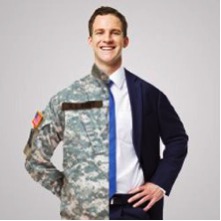Why did I headline this article with this phrase “Recruiting GI Joe?” If you need to recruit veterans and don’t realize the negative connotation of the title, then it will behoove you to read on.
Terms like PCS. ETS. NCO — do you know what these stand for and what they mean? Do you know what Terminal Leave is? No, it’s NOT medical leave for someone who is dying.
If you have not grown up in or around the military, chances are you are not even aware of what uniformed personnel actually do for a living. If you do not understand the context of the role or the branch of the military, you will not be able to translate the highly desirable “military” skills and suitability for your company that our members of the military possess.
But, back to this article’s headline. I chose it for the shock value, because unfortunately, it is SHOCKING how many recruiters, when they see “U.S. Army” on a resume, have images of the last movie they saw in which armed military gunned down innocents in a village.
Things about veterans that recruiters should know
If this is you, please read or watch Band of Brothers, which tells of American soldiers escaping from hospitals to rejoin their teammates on  the battlefield. This is based on true, historical accounts. Would you do this to help your teammates who are in the trenches with an urgent hiring requisition? Would you personally respond to candidates while in a hospital recovery room? Yes, I have done this.
the battlefield. This is based on true, historical accounts. Would you do this to help your teammates who are in the trenches with an urgent hiring requisition? Would you personally respond to candidates while in a hospital recovery room? Yes, I have done this.
You cannot discriminate against veterans, but what about your internal bias? In speaking with recruiters, I have found that most have a “Fear of the Unknown,” or “Don’t understand it, so will simply swipe left.”
Here are some things you should know. But, you don’t have to take MY word for it! (Special shout out to LeVar Burton on Reading Rainbow.) After speaking with Karen Hunter about veteran job tips for Military Appreciation Month on SiriusXM Urban View, I was deluged by thanks from veterans for sharing spot-on tips for them.
I then asked this question: “If you could give recruiters ONE tip for recruiting you, what would it be?” What follows is a compilation of their input, and my hope is that it will help you to understand how to more effectively recruit veterans, thereby becoming better at your craft and successful in connecting great talent with great positions in great companies.
Attributes that veterans bring to the table
Let’s start with some of the required attributes. But first, a caveat.
Just as there are “bad cops,” “bad teachers,” “bad nurses,” etc., not everyone who served in the military possesses all the positive traits you want. The myth that some people believe is that if you are “bad” you get a dishonorable discharge.
Truth be told, many are not permitted to re-enlist because they did not maintain the high standards of their position or the basic requirements for military service. A military orchestra member was late a few times, and forgot his uniform for one concert. He was not permitted to re-enlist, but received an honorable discharge.
Now, just a few of the great attributes:
- Chain of command — Nearly all veterans understand how to work under supervision, and have learned skills on how to work under bad supervisors or supervisors who micromanaged every detail of their work. They were required to demonstrate respect, even when in disagreement. This is a life skill I wish could be taught before anyone graduates from high school!
- Team player — There are few, if any, military roles that do not require working in a team, collaborating with other teams, and seeking to execute on tasks where one’s life could depend on someone else’s competence. There are few “Lone Ranger” positions, which means that, at the very least, the veteran has learned to flex, adapt, and cooperate with diverse individuals.
- Being on time — Punctuality is not optional. In the military, excuses for traffic, weather, failed alarm clocks, etc., simply do not exist.
- Preparedness — Having all of the proper gear in working order and understanding specific processes becomes rote. Imagine a team member who ensures that everything that is necessary to execute on task and on time comes to work at your company every day!
- Rapid response — In many positions, life-or-death circumstances dictate the imperativeness of being focused, always aware of one’s surroundings, and being trained to think logically and act confidently. This is an exemplary skill to navigate competing deadlines and/or a change of direction.
- Humility — This is, perhaps, one of the most important qualities of which you, as a recruiter, need to be aware. Military personnel have confided in me time and again that it is instilled in them to not brag, not to showboat, or draw personal attention to themselves. In short, you must ask probing questions because chances are, many phenomenal accomplishments (you’ll also learn about the more military term “successes”) have not been disclosed in the resume, and certainly not on their LinkedIn profile.
Here is where you do not ask, “What is your proudest career accomplishment to date?” If you are still asking these type of questions, my suggestion is to start reading more blogposts to update your relevance to this particular decade.
Instead, ask this: “Tell me about some of the most memorable successes that you and your team achieved.” The comfort level in speaking about the team’s successes will facilitate a greater ease for the veteran in relaying the information you are seeking.
You MUST be “veteran-friendly”
Some more detailed explanations…
“When can you start?”
Let’s start with “Terminal Leave” and “Permissive TDY”. It is important to note that the, “When can you start?” answer can depend on  whether a person is retiring or separating. For example, if officers are on terminal leave, they may be able to start during that time if the position is in a different location. In federal contracting, one cannot be sent back into the same building as a civilian unless one has already ETSed (Expiration of Term of Service – officially no longer in the military).
whether a person is retiring or separating. For example, if officers are on terminal leave, they may be able to start during that time if the position is in a different location. In federal contracting, one cannot be sent back into the same building as a civilian unless one has already ETSed (Expiration of Term of Service – officially no longer in the military).
“What is your current salary?”
Your job is to figure out their current compensation with them. There is non-taxable income, indicating approximately 25% more take-home pay. Medical, dental and vision is paid for, so no co-insurance and nearly no out of pocket medical expenses. There is a housing allowance. There is a food allowance. Are you now seeing how the “current salary question” is not applicable to transitioning/transitioned members of the military?
There is an excellent Military-to-Civilian calculator that can assist you – and I suggest using it early on in the recruiting process for personal and organizational education. In fact, most veterans simply do not know their market value in the civilian world, so DO NOT take advantage of them by low-balling their salary. In fact, please don’t do this with anyone you are vetting.
In order to #RecruitHuman, you must treat others as you would like to be treated. One major way you can serve veterans is by helping them to assess the salary range that they should be targeting, commensurate with their translatable skills. Do this and they’ll tell their friends, and quite likely will positively brand your company as “veteran-friendly.”
I just read a posting on LinkedIn from a retiring lieutenant colonel. His lament? He was turned down for an IT position because he had “too much” management experience.
Put on your talent sleuthing hat and make inquiries about his/her actual experiences. In transition classes, officers are told to emphasize their managerial skills, and when you look at their experience in personnel, budgets, logistics, etc., it is impressive! You need to know how many people are in which reference unit.
Assessing a veteran’s managerial experience
Although the U.S. Army has not officially used these designators since World War II, you will see these terms on resumes. Depending upon the size of the unit, someone will have varying degrees of operational, organizational and financial accountability in very much the same way a person will have when performing the role in a non-military environment.
The information below is derived from an Army Operational Unit Diagram:
- Squad/section: 4 to 10 soldiers;
- Platoon: 3 to 4 squads/sections of 16 – 44 soldiers;
- Company/battery/troop: 3 to 5 platoons of 60 – 200 soldiers;
- Battalion/squadron: 4 to 6 companies of 300 – 1,000 soldiers;
- Brigade/regiment: 2 to 5 battalions of 1,500 – 3,200 soldiers;
- Division: 3 brigades of 10,000 – 16,000 soldiers;
- Corps: 2 to 5 divisions of 20,000 – 45,000 soldiers;
- Field army: 2 plus corps of 50,000 plus soldiers.
These details are provided so that you can understand, contextually, what you are reading on a veteran’s resume. Some of us have never even been on a team of 50,000 plus people, much less have had responsibility for the execution of their tasks, their personal health and welfare, the logistics, the supplies, etc.
Officers and NCOs (Non-Commissioned Officers) work in tandem to achieve the goals and objectives. Do not let rank fool you! The sergeant major may have carried greater responsibility for the outworking of the directives than the OIC (Officer-in-Charge). Higher ranking does not always mean more depth of expertise/experience. There are also other variables at play here. Only a certain number of applicants (those who enlisted prior to college or college graduation) are accepted into Officer Candidate School (OCS). This does not mean that those who were not accepted are less qualified or should be less regarded than a higher ranking person. Other factors dictate rank progression, so again, do not judge a person based on final rank.
More terms you should know
- MOS (Military Occupational Specialty) — One attends a specialized school after basic training. When you see this on a resume, it tells you what career path was at the onset of the career, but you need to evaluate career progression to see if the person stayed the course or deviated from it. I spoke with someone at a career fair who had 7 by the end of her career. If there is a deviation, that is a great interview question! Make an inquiry, and find out if they followed their passions, or if there was another compelling reason for the change.
- PCS (Permanent Change of Station). What this means for you: if you are in Austin, and someone is in Washington, DC, chances are they are applying to your position because they are having their final move paid for. This means you will not have to pay for relocation! I know recruiters who had no clue about this and rejected out of state candidates for this reason. Not you, though, because now you know! USAA has a comprehensive guide to Permanent Change of Station and can be found here.
Look for reasons to rule them in, not out
Not all resumes are going to be written with your position in mind. Many will list every duty station, sometimes as separate positions. Do your best to read between the lines, and if you do not see what you are looking for or do not understand what you are reading, set up a phone screen. It is always better to clarify than to overlook. Keep finding reasons to rule people in, not out.
Acclimation is an issue, too
Now, about a lack of knowledge of “the way things work.” If you live near a military base or post, contact the SFL-TAP (Soldier for Life — Transition Assistance Program), and here are links for TAPS to each branch of the military:
- Army;
- Navy/Marines (in case you didn’t know, the Navy and Marines work together);
- Air Force;
- Coast Guard
Ask to take the Director to lunch. Prepare a list of questions to help you to know who you are targeting, what to do when you find them, how to understand what they have done, and what assistance they will need from you to determine viability for your company and/or your positions. Also, remember to pay for the lunch!
Finally, you have successfully hired a veteran. Congratulations! Does your company have a retention plan in place?
Yeah, about that. It is great to provide veterans their first civilian job in a while (for some, after 20 plus years), but this transition will be a culture shock. If your company is not located in a military-centric part of the country, many support services may not be available to your veterans.
Just as you had a million questions about how to convert military terms into civilian-ese, veterans may not have had exposure to many current terms and jargon that we take for granted. It’s up to you to extend your normal onboarding program into a year-long acclimation program for veterans.
Also, they may have to hang out at “acronym finder” sites to know what everyone is LOLing about on the Slack channel. Make it easy for them to identify when they are not “getting” something, and to provide a safe environment within which they can ask questions and get great, non-judgmental support.
Successful hiring and onboarding veterans
Have a “mentor” who checks in daily for the first few weeks, twice a week for a few weeks, and once a week for at least until the 90-day mark. When I first moved to Utah, I didn’t know the lingo, didn’t understand the customs (like Trunk or Treat), didn’t know what was appropriate and not appropriate in terms of inviting my child’s classmates to the house, etc. I befriended my neighbor, who gave me tutorials on the culture, was there for any random question I might have, and I watched a few videos. Without her, I probably would not have made it through those initial few months. Let’s make sure we all have “buddy systems” in place to ensure great employee engagement, team building, and the “R” word of the day: RETENTION!
Remember: Do not hire veterans because, “It is the right thing to do.” You should hire great veterans so that you can leverage those years of experience and training, stellar work ethics, and proven character to make great contributions to your company.
 ABOUT THE AUTHOR: Jo Weech is the Chief People Officer at Anthem Engineering. She also started Exemplary Consultants to assist start ups and small businesses solidify infrastructure with everything from HR to Operations. An organizational zealot, Jo enjoys new methodology, technology, and new challenges. She teaches a four week class on how to project manage your life and organize your living/working spaces for optimal efficiency. She also speaks to local career transition groups, career panels, career fairs, universities, and ETAP/TAP/RTAP classes for military transition. Follow her on Twitter @JoWeech and connect with her on LinkedIn.
ABOUT THE AUTHOR: Jo Weech is the Chief People Officer at Anthem Engineering. She also started Exemplary Consultants to assist start ups and small businesses solidify infrastructure with everything from HR to Operations. An organizational zealot, Jo enjoys new methodology, technology, and new challenges. She teaches a four week class on how to project manage your life and organize your living/working spaces for optimal efficiency. She also speaks to local career transition groups, career panels, career fairs, universities, and ETAP/TAP/RTAP classes for military transition. Follow her on Twitter @JoWeech and connect with her on LinkedIn.
By Jo Weech
As the Founder of Exemplary Consultants, Jo Weech enjoys assisting companies excel in both recruiting and retention, to infuse enthusiasm into strategy and execution. Speaking engagements include national/international HR and Recruiting conferences and career transition groups. In 2016, Jo was awarded the HRLA Leadership Excellence award. In 2017, she was named by RecruitingDaily as one of 300+ Women in HR Technology to Follow and Support, was awarded the Gary Cluff Award for Recruiting Excellence, and the award for Best Presentation at DisruptHR NYC, category of “HR is Awesome”. In November 2017, Jo traveled to Japan in a US delegation of top HR and Talent Acquisition Professionals. She has a passion to partner with people in her profession to continue to raise the bar of excellence and efficiency.
Recruit Smarter
Weekly news and industry insights delivered straight to your inbox.





